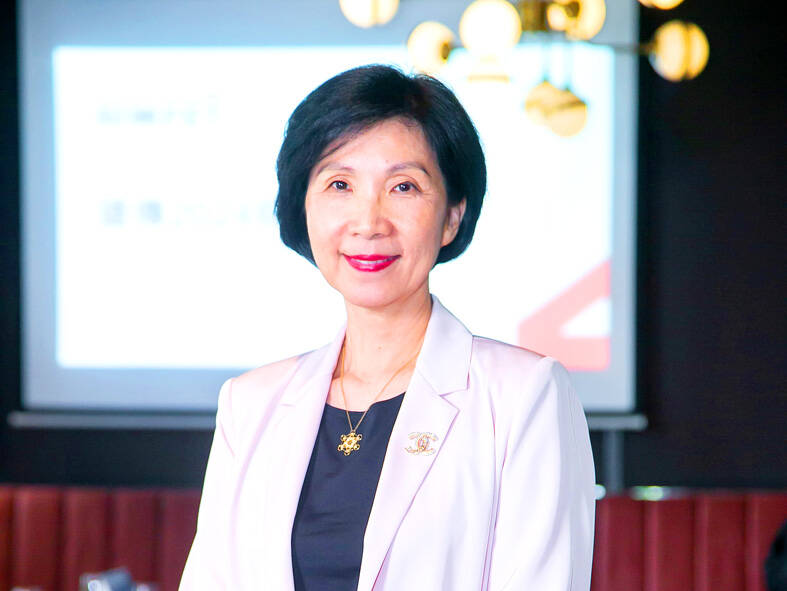Far EasTone Telecommunications Co (遠傳電信) yesterday said it aims to turn around its earnings next year and hopes to report healthy double-digit percentage growth in 2026, aided by its acquisition of Asia Pacific Telecom Co (亞太電信).
The telecom’s earnings per share fell 4.1 percent to NT$0.81 in the first three months of this year, compared with NT$0.85 in the same period last year, diluted by an increase of 9.6 percent in capital shares.
However, net profit increased 6.1 percent year-on-year to NT$2.92 billion (US$90.18 million) from NT$2.75 billion, surpassing the company’s forecast of NT$2.8 billion per quarter.

Photo courtesy of Far EasTone Telecommunications Co via CNA
“We hope to make a turnaround in the second year [of the Asia Pacific Telecom acquisition]. For the third year, we hope to return to our previous growth path of double-digit percentage growth,” Far EasTone president Chee Ching (井琪) told reporters in Taipei. “Earnings in 2026 will exceed that of last year.”
Far EasTone formally acquired Asia Pacific Telecom on Dec. 15 last year. The acquisition helped boost Far EasTone’s mobile subscriber base to 9.08 million users at the end of last year from 7.22 million in the third quarter of last year.
However, the acquisition was a drag on its average revenue per unit (ARPU) in the initial phase.
Far EasTone’s ARPU fell to NT$695 last quarter, from NT$746 in the fourth quarter of last year, as a bulk of Asia Pacific Telecom’s users are low-tariff subscribers.
“We expect to see significant incremental growth in ARPU,” Ching said, citing the company’s three-year business plan implemented following the absorption of the smaller telecom.
“We will offer more value-added services, including new artificial intelligence applications, to drive ARPU. We already have some on offer and will have much more this year and next year in collaboration with start-up partners,” she said.
Far EasTone has already shown some positive signs of growth, as about 70 percent of Asia Pacific Telecom users signed up for higher-tariff subscriptions when they switched to Far EasTone, the company said.
Far EasTone expects its 5G penetration to climb to about 45 percent this year, compared with 37 percent at the end of last year together with Asia Pacific Telecom.
Far EasTone said it expects 20 percent of its total revenue to come from non-traditional telecom services, a similar portion to last year.
Revenue this year is expected to increase 12 percent annually from NT$93.69 billion last year, it said.
The telecom said the acquisition would help save operational expenses from the second half of this year, following the integration of its base stations with those of Asia Pacific Telecom.
Capital expenditure would fall to NT$7.3 billion this year from NT$8.1 billion last year, it added.

UNCERTAINTY: Innolux activated a stringent supply chain management mechanism, as it did during the COVID-19 pandemic, to ensure optimal inventory levels for customers Flat-panel display makers AUO Corp (友達) and Innolux Corp (群創) yesterday said that about 12 to 20 percent of their display business is at risk of potential US tariffs and that they would relocate production or shipment destinations to mitigate the levies’ effects. US tariffs would have a direct impact of US$200 million on AUO’s revenue, company chairman Paul Peng (彭雙浪) told reporters on the sidelines of the Touch Taiwan trade show in Taipei yesterday. That would make up about 12 percent of the company’s overall revenue. To cope with the tariff uncertainty, AUO plans to allocate its production to manufacturing facilities in

Taiwan will prioritize the development of silicon photonics by taking advantage of its strength in the semiconductor industry to build another shield to protect the local economy, National Development Council (NDC) Minister Paul Liu (劉鏡清) said yesterday. Speaking at a meeting of the legislature’s Economics Committee, Liu said Taiwan already has the artificial intelligence (AI) industry as a shield, after the semiconductor industry, to safeguard the country, and is looking at new unique fields to build more economic shields. While Taiwan will further strengthen its existing shields, over the longer term, the country is determined to focus on such potential segments as

TAKING STOCK: A Taiwanese cookware firm in Vietnam urged customers to assess inventory or place orders early so shipments can reach the US while tariffs are paused Taiwanese businesses in Vietnam are exploring alternatives after the White House imposed a 46 percent import duty on Vietnamese goods, following US President Donald Trump’s announcement of “reciprocal” tariffs on the US’ trading partners. Lo Shih-liang (羅世良), chairman of Brico Industry Co (裕茂工業), a Taiwanese company that manufactures cast iron cookware and stove components in Vietnam, said that more than 40 percent of his business was tied to the US market, describing the constant US policy shifts as an emotional roller coaster. “I work during the day and stay up all night watching the news. I’ve been following US news until 3am

COLLABORATION: Given Taiwan’s key position in global supply chains, the US firm is discussing strategies with local partners and clients to deal with global uncertainties Advanced Micro Devices Inc (AMD) yesterday said it is meeting with local ecosystem partners, including Taiwan Semiconductor Manufacturing Co (TSMC, 台積電), to discuss strategies, including long-term manufacturing, to navigate uncertainties such as US tariffs, as Taiwan occupies an important position in global supply chains. AMD chief executive officer Lisa Su (蘇姿丰) told reporters that Taiwan is an important part of the chip designer’s ecosystem and she is discussing with partners and customers in Taiwan to forge strong collaborations on different areas during this critical period. AMD has just become the first artificial-intelligence (AI) server chip customer of TSMC to utilize its advanced